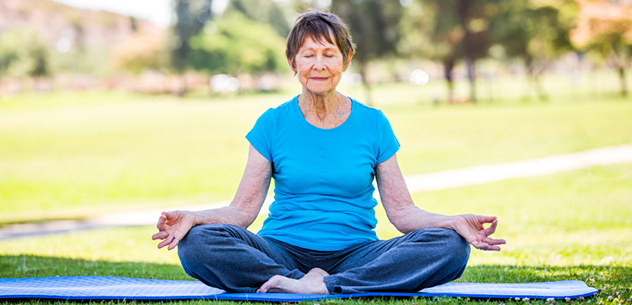As we age it can be harder to get around and stay as energized as we were in our younger days. Becoming dramatically less social and active can also lead to a variety of ill-health effects. These effects often include both weight gain and muscle loss due to the decrease in mobility and movement. Slowing down can also bring emotional changes like depression and feelings of loneliness.
It’s imperative that older women take care of their physical as well as social needs. Engaging in regular activities outside the home, at community centers, or within their assisted living facilities, can help ease these common issues associated with old age.
One such social activity that has shown benefits to both the mind and spirit, especially for older adults, is participation in a regular meditation. Here is some more information about this discipline that will fuel the fire of an elder’s quest for guided meditative practice.

Meditation
Meditation reduces stress and increases both acceptance and happiness
Older women are often more susceptible to depression than younger adults due to their multiple chronic medical conditions and history of traumatic life events. Loss of an independent lifestyle and the need for in-home caregiving or round the clock monitoring can also be a contributing factor to depressive symptoms and builds up a healthier heart.
However, meditation practices are known to help regulate mood and anxiety disorders to the same degree as antidepressant drug therapy, but without the dangerous side effects of those medications. Meditation can also reduce depression and negative ruminative beliefs.
Meditation improves concentration and slows mental aging
There have been studies that show that only as little as 20 minutes a day of meditation can help improve concentration, especially with dull tasks. In some cases, meditation increased performance over 10 times the abilities of others.
Meditation is also shown to literally grow the brain which can help counteract mental aging. It can also keep our minds fresh and safer from so-called degenerative diseases like Alzheimer’s and dementia.
Meditation can relieve pain and make us stronger against it
One study of Zen monks by a research group at the University of Montreal found that when exposed to heat, monks actually reported less pain while in a meditative state, and even their MRIs indicated less pain as well. This proved that, deep in their minds, they literally registered and felt less pain than while in a non-meditative state.
Another study found a 40 percent reduction in pain reported after only four days of guided practice in meditation. This proves that even those new to meditation can see substantial pain management benefits.
These research results have long-reaching implications. The results of these studies and others are especially encouraging to those opposed to pain management medications. Some medications can have harmful side effects or may cause complications for elderly adults. Strong pain medications can interfere with quality of life while also making it harder to stay active and social. Alternatives, like meditation or home cardio workouts, may be a better solution for older adults when it comes to pain management.
There are thousands of documented studies on the health benefits of mindfulness training and meditation. The positive outcomes are overwhelming clear and prove numerous reasons for older adults to learn and practice regular meditative techniques.


